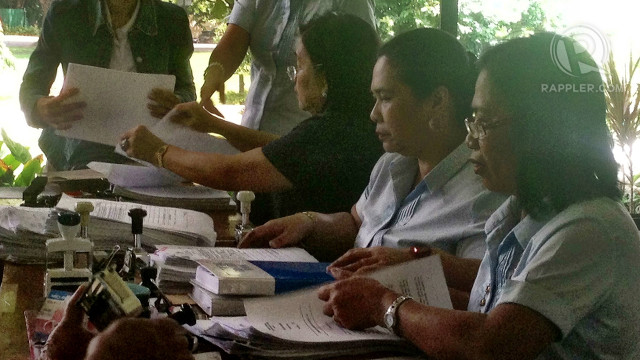SUMMARY
This is AI generated summarization, which may have errors. For context, always refer to the full article.

MANILA, Philippines – In the pile of bills filed on the 1st day of the 16th Congress, it was the only bill filed by a citizens’ group.
On Monday, July 1, the “people’s version” of the Freedom of Information (FOI) Bill was filed at the House of Representatives by the Right to Know. Right Now! Coalition, composed of 18 petitioners so far. The measure seeks to install fast procedures in obtaining government documents of high public interest.
It was filed through an indirect initiative – a mechanism under the law that allows recognized organizations to file their own bills in Congress. Under Section 11 of Republic Act 6735, bills filed through an indirect initiative shall have precedence over other bills pending in the committee.
READ: FOI: Advocates pursue new initiative
House Secretary-General Marilyn Barua-Yap received the measure. Indirect initiatives require a different process than bills filed by congressmen.
The coalition’s version of the FOI Bill considers all amendments introduced by various stakeholders, including Malacañang’ proposed version, since it was introduced in Congress a decade ago, said lawyer Nepomuceno Malaluan, lead convenor of the Right to Know. Right Now! Coalition.
“It seeks to clarify the scope of the guarantee by defining exactly what are covered and what can be exempted,” Malaluan said. “Without clear exemptions, it is easy for government agencies to give discretion on what can be accessed and not accessed.”
The proposed measure also wants to impose administrative and criminal sanctions on government officials who would fail to respond to requests. They may be suspended for 6 months to one year on first offense and be dismissed from public service on 2nd offense.
It also imposes criminal liability of between one month and 6 months should a public official deny the existence of information required to be available by the proposed law or should they destroy documents being requested.
Contents of the ‘People’s FOI Act’
Under the proposed measure, all Filipinos shall have access to information under the control of a government agency except for the following:
- classified documents relating to national security or internal and/or external defense of the State, as well as foreign affairs, when it will unduly weaken the negotiating position of the government or jeopardize our diplomatic relations, provided that a period to declassify is enforced;
- minutes or records of advice given or of opinions expressed during decision-making or policy formulations invoked by the President to be part of presidential communications privilege, provided that there is an order for a period to declassify;
- those relating to internal and external defense and law enforcement when the information:
- compromises legitimate military or law enforcement operation
- compromises or interferes with prevention, detection of suppression of criminal activity, or effective implementation of immigration controls and border security
- discloses the identity of a confidential source
- discloses techniques and procedures for law enforcement investigations
- endangers the life or physical safety of any individual
- impairs the impartiality of verdicts, or otherwise obstructs the administration of justice
- relates to trade, industrial, financial, or commercial secrets of a natural of juridical person other than the requesting party
- comprises privileged communications in legal proceedings by law
- would render an intended government agency actions ineffective unless the anticipated danger has ceased.
The coalition’s FOI Bill version does not contain a right-of-reply provision, which seeks to require media organizations to publish the side of a public official who might be implicated through information accessed through the FOI Bill.
Freedom of Information – indirect initiative by Rappler Philippines
House advocates plan strategy
Malaluan said the coalition decided to file its own version of the bill instead of merely depending on the support of their champions in Congress – the strategy they employed in the 15th Congress.
Last Congress, the FOI Bill only managed to pass the committee level. Even when it was transmitted to the plenary with still 4 months left before Congress went on recess for the midterm elections, solons still failed to tackle it on the floor.
Back then, FOI advocates blamed House public information committee chairman Ben Evardone’s supposed failure to schedule enough committee hearings to tackle the bill.
This time around, FOI champions in the House want to make sure that the chairmanship of the public information committee will go to a solon sympathetic to the measure.
Ifugao Rep Teddy Brawner Baguilat Jr said FOI champions have agreed to circulate a petition to be sent to Speaker Feliciano Belmonte Jr indicating that any of the FOI advocates are available as an applicant for the chairmanship.
Once Belmonte gives his go signal, Baguilat said FOI allies will choose among themselves who to nominate for the post.
“We need the chairmanship of the public information committee to facilitate the passage of the FOI on committee level,” Baguilat said in a text message.
Malaluan said more groups are set to join the coalition when it files a counterpart bill in the Senate in the coming weeks. – Rappler.com
Add a comment
How does this make you feel?
There are no comments yet. Add your comment to start the conversation.